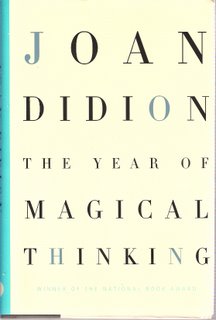 Review: The Year of Magical Thinking, Joan Didion (2006)
Review: The Year of Magical Thinking, Joan Didion (2006)Didion is shattered when her husband, novelist John Gregory Dunne, collapses with a heart attack on 30 December 2003. In true Didion style, she analyses her reactions to this loss, trying to make sense of what appears to be a disaster of epic proportions.
She is also made to struggle with the health problems of their daughter, Quintana, who had pneumonia. Once discharged from the hospital, Qunitana goes with her husband to Los Angeles to recuperate. There, she collapses again, near death.
A bad year, 2004, from Didion's perspective. A terrible year.
In her trademark, crisp, unassailable prose, Didion takes us through the whole process. The 'magical thinking' of the title is her inability to concieve of her husband as being truly gone. She expects him to return at any moment. She muses on the possibility that he knew he was to die. She considers his novels, their arguments, their trips abroad and their movements in the United States throughout a long life of companionability and satisfaction.
Clearly, she loved him. But we wonder how he took to the fact that his wife was far better-known than he. She is a literary superstar while he is . . . a writer who nobody reads. We wonder whether she feels some satisfaction at this. We wonder how well they got on in bed.
Did they have sex for forty years? Was she still in love with him? The level of detail that Didion engages with in this magisterial study of bereavement points to other questions that are left unanswered. Having been told this much, we want to know more.
Was Dunne a decent writer? (I'd never heard of him.) Did they still have sex? (The downfall of many marriages.) But we are not invited in that far. Only thus far, and no further . . .
This is a brave book. It seems to have required a considerable measure of gumption to go even this far. Didion, who has taken so many other aspects of her life and written about them, now takes us into her mind at a time of great stress and weakness. It is almost as if, without writing about it, she couldn't really come to grips with it. There is a philosophical point to be made here, but I lack the requisite vocabulary. Needless to say, Didion emerges as a writer first and foremost, and we are glad she took the plunge.
1 comment:
Post a Comment